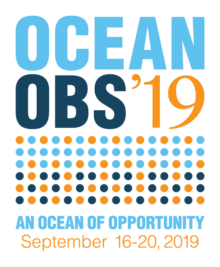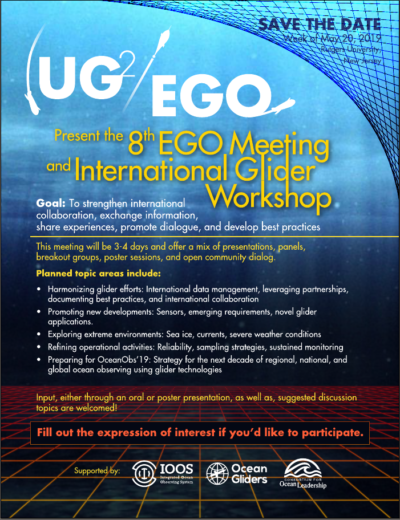Events
-
NOAA/AOML and IOOS science seminars on hurricane gliders, April 29, 2-4pm Eastern US time.
NOAA/AOML and IOOS hosted a seminar series with 6 short science seminars on hurricane gliders on April 29, 2-4pm Eastern US time.
Hurricane glider talks, April 29, 2020; 2-4pm:- Upper ocean from representation using moving and stationary profilers, George Halliwell (NOAA/AOML)
- Mid Atlantic Bight: Stratified Coastal Ocean Interactions with Tropical Cyclones, Scott Glenn (MARACOOS/Rutgers)
- The link between the upper ocean and 2017 Atlantic hurricanes, Ricardo Domingues (CIMAS and NOAA/AOML)
- South Atlantic Bight: Insights from Gliders Deployed for Hurricane Florence (2018), Catherine R. Edwards (SECOORA/SkIO)
- The upper ocean conditions in the Gulf of Mexico during Hurricane Michael (2018), Matthieu Le Henaff (CIMAS and NOAA/AOML)
- Northeastern Caribbean: Hurricane Dorian (2019) and Essential Ocean Features, Doug Wilson (OCOVI)
To access the recorded session : (to be published)
-
OceanObs' 19
Every 10 years, OceanObs meeting brings together the ocean observing community to review the progresses made in the implementation of the GOOS and discuss the strategy of the next decade. This edition, OceanObs 19, will be hold in Honolulu, Hawaï, USA from the 16 to 20 of September. OceanGliders will promote the development of sustained gliders observations and the Boundary Ocean Observing Network. JCOMMOPS will have a booth there to present the evolution of the system that recently integrate OceanGliders.

-
[SAVE THE DATE] 8th EGO Meeting and International Glider Workshop, Week of May 20th 2019, Rutgers University
Dear Glider Community Members,
We are pleased to announce an upcoming event: the 8th EGO Meeting and International Glider Workshop scheduled for the week of May 20th, 2019 at Rutgers University, New Jersey. Official event handout attached. The goal of this workshop will be to strengthen international collaboration, exchange information, share experiences, promote dialogue, and develop best practices. This meeting will be 3-4 days and offer a mix of presentations, panels, breakout groups, poster sessions, and open community dialog.
The planned topic areas for the workshop include:
- Harmonizing glider efforts: International data management, leveraging partnerships,
- Documenting best practices, and international collaboration
- Promoting new developments: Sensors, emerging requirements, novel glider applications.
- Exploring extreme environments: Sea ice, currents, severe weather conditions
- Refining operational activities: Reliability, sampling strategies, sustained monitoring
- Preparing for OceanObs’19: Strategy for the next decade of regional, national, and global ocean observing using glider technologies
